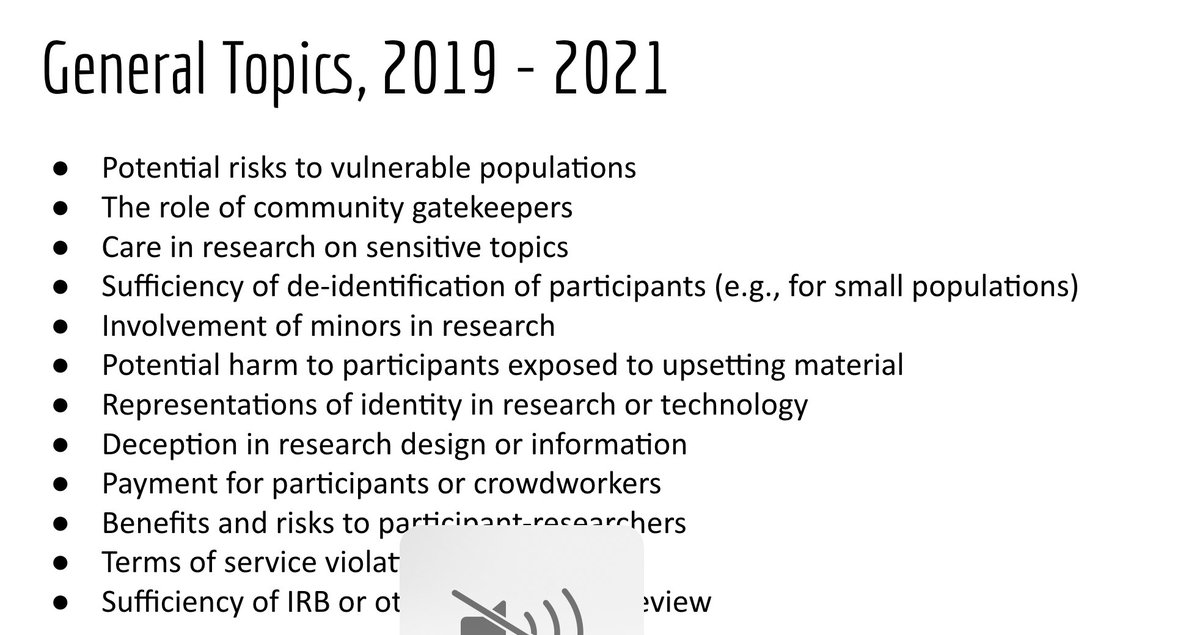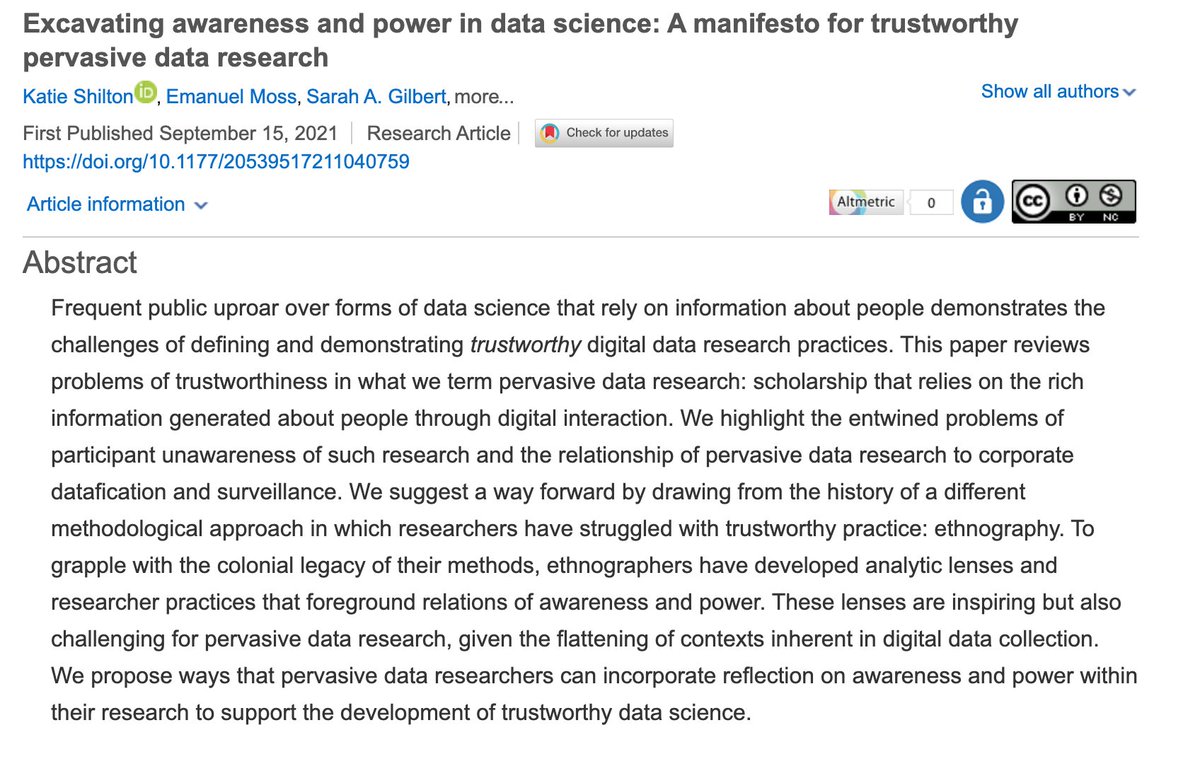
Facebook's re-branding/focus raises a question: if "connection is evolving," then how will the problems with connection via social media evolve? Coincidentally, today in my information ethics and policy class students did a speculative ethics exercise on this exact question. 🧵
https://twitter.com/sarafischer/status/1453788413484797956
Groups of students chose one of the issues raised in the facebook papers reports (algorithmic curation, misinformation, body image, content moderation, hate speech, etc.) and speculated about how that might manifest in the metaverse, and then about possible solutions/mitigation.
For example:
Disinformation. How might inaccurate perceptions of reality be even more severe in VR/AR? There have already been discussions about watermarks on deepfake video - should easy distinction between what's real versus not be a required feature?
Disinformation. How might inaccurate perceptions of reality be even more severe in VR/AR? There have already been discussions about watermarks on deepfake video - should easy distinction between what's real versus not be a required feature?
Screen time, design towards time-on-platform.
Could more immersion exacerbate "social media addiction"? What will the VR version of "infinite scroll" be? What will be the techniques to try to keep us online? Are there going to need to be methods to encourage people to log off?
Could more immersion exacerbate "social media addiction"? What will the VR version of "infinite scroll" be? What will be the techniques to try to keep us online? Are there going to need to be methods to encourage people to log off?
Data privacy.
What kind of biometric data might become commonplace for collection in connecting to the metaverse? If we think really far out... at what point do we get brain-computer interfaces and what kind of data privacy laws are we doing to need?
What kind of biometric data might become commonplace for collection in connecting to the metaverse? If we think really far out... at what point do we get brain-computer interfaces and what kind of data privacy laws are we doing to need?
The digital divide.
Access to the internet is already a source of inequality. Imagine if the same benefits to social media use are now behind the paywall of not just a mobile phone - but an occulus rift.
Access to the internet is already a source of inequality. Imagine if the same benefits to social media use are now behind the paywall of not just a mobile phone - but an occulus rift.
Identity theft through impersonation.
There's already a problem with people creating fake social media accounts of people (this happened to me!) - how do we deal with VR "clones"? But also how do we deal with trade-offs between safety and identity authentication, and privacy?
There's already a problem with people creating fake social media accounts of people (this happened to me!) - how do we deal with VR "clones"? But also how do we deal with trade-offs between safety and identity authentication, and privacy?
Content moderation.
How will all of the current challenges of social media moderation (bias, PTSD for human moderators, etc.) translate into the metaverse? Because they definitely will.
(There's actually some really interesting speculation about this in Ready Player Two.)
How will all of the current challenges of social media moderation (bias, PTSD for human moderators, etc.) translate into the metaverse? Because they definitely will.
(There's actually some really interesting speculation about this in Ready Player Two.)
Body image.
Given what we know about Instagram and body image, especially for young girls, you can imagine how this might be exacerbated in VR/AR - what if "filters" become more closely connected to in-person interaction?
Given what we know about Instagram and body image, especially for young girls, you can imagine how this might be exacerbated in VR/AR - what if "filters" become more closely connected to in-person interaction?
Unfair competition.
There's already concern that Facebook "owns" too much of the social media space. But owning the metaverse *could* look more like owning the internet if it really takes off. Do we need an anti-trust crackdown now?
There's already concern that Facebook "owns" too much of the social media space. But owning the metaverse *could* look more like owning the internet if it really takes off. Do we need an anti-trust crackdown now?
Social media embedded into society.
Imagine the "Nosedive" Black Mirror episode but with AR added into the mix. If we are "in" social media for even more of our in-person lives, how might it become even more deeply embedded?
Imagine the "Nosedive" Black Mirror episode but with AR added into the mix. If we are "in" social media for even more of our in-person lives, how might it become even more deeply embedded?
Targeted advertising in the metaverse.
What new information about us might be added to models for targeted advertising, and also HOW might things be advertised to us, e.g. in AR?
(Remember @radicalbytes' Google Glass based Admented Reality remix? )
What new information about us might be added to models for targeted advertising, and also HOW might things be advertised to us, e.g. in AR?
(Remember @radicalbytes' Google Glass based Admented Reality remix? )
It was a really interesting discussion, but too brief, and if I'd known the announcement was going to drop later today I'd have spent more time on it! It was design ethics week, so we talked about speculation as part of technology design, ala ethical debt. wired.com/story/opinion-…
The Meta webpage links to this page on Responsible Innovation that lists four principles. They could be summarized as transparency, control, inclusivity, and responsibility. about.facebook.com/realitylabs/re…
I have about ten ideas for op-eds that combine the facebook papers with this announcement with plot points from snow crash and ready player one.
and of course as soon as I posted about this on tiktok someone mentioned @hankgreen's A Beautifully Foolish Endeavor, too. :) Which is a great example actually compared to the other two metaverse/VR books because it's more near future.
As I sometimes say, don't focus TOO much on science fiction because we need to be thinking more about e.g. current actual AI ethics problems than preparing for the robot wars. But as Asimov said, science fiction writers foresee the inevitable catastrophes. So worth a glance. :)
Also if you need to provide a quick “what…?” explanation for someone about Meta/metaverse here is a TikTok.
Final thought on speculative ethics for the push to social AR/VR (and other social media futures): some science fiction to prepare you for the metaverse dystopia.
Snow Crash by Neal Stephenson
Feed by MT Anderson
Catfishing on the Catnet by Naomi Kritzer
The Circle by David Eggers
After On by Rob Reid
Ready Player One/Two by Ernest Cline
A Beautifully Foolish Endeavor by Hank Green
(a list based on what I have physical copies of :) )
Feed by MT Anderson
Catfishing on the Catnet by Naomi Kritzer
The Circle by David Eggers
After On by Rob Reid
Ready Player One/Two by Ernest Cline
A Beautifully Foolish Endeavor by Hank Green
(a list based on what I have physical copies of :) )
• • •
Missing some Tweet in this thread? You can try to
force a refresh







